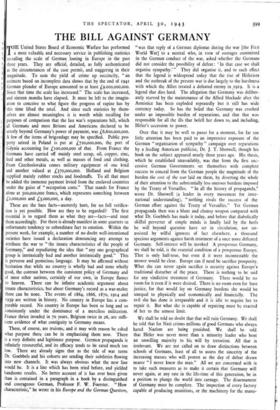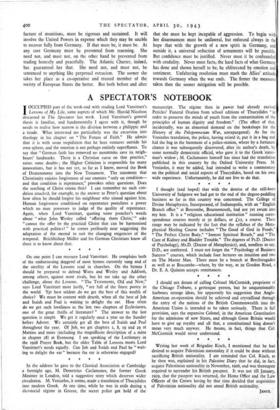THE BILL AGAINST GERMANY
THE United States Board of Economic Warfare has performed a most valuable and necessary service in publishing statistics revealing the scale of German looting in Europe in the past three years. They are official, detailed, as fully authenticated as the circumstances of the case permit, and staggering in their magnitude. To sum the yield of crime up succinctly, " an estimate based on incomplete data shows that by the end of 1941 German plunder of Europe amounted to at least £9.000,000,000. Since that time the scale has increased." The scale has increased, and sixteen months have elapsed. It must be left to the imagin- ation to conceive to what figure the progress of rapine has by this time lifted the total. And since such statistics by them- selves are almost meaningless it is worth while recalling for purposes of comparison that the last war's reparations bill, which all Germans and most Britons and Americans declared to be utterly beyond Germany's power of payment, was £6,600,000,000. A few of the items of brigandage may be specified. Public pro- perty seized in Poland is put at E720,000,00o, the port of Gdynia accounting for Lroo,000,000 of that. From France the Germans have carried off mainly steel scrap, oil, copper, zinc, lead and other metals, as well as masses of food and clothing.
From Czechoslovakia comes military equipment of one kind and another valued at £370,000,000. Holland and Belgium supplied mainly rubber stocks and foodstuffs. To all that must be added the immense payment levied from the enslaved countries under the guise of " occupation costs." That stands for France alone at soo,000,000 francs, which represents something between £2,000,000 and ‘3,000,000, a day.
These are the bare facts—austerely bare, for no full verifica- tion is yet possible. How are they to be regarded? The first essential is to regard them as what they are—facts—and treat them accordingly. For there is already manifest in some quarters ;n unfortunate tendency to subordinate fact to emotion. Within the present week, for example, a number of no doubt well-intentioned societies have issued a declaration denouncing any attempt to attribute the war to " the innate characteristics of the people of Germany," and repudiating the idea that " any one geographical group is intrinsically bad and another intrinsically good." This is perverse and pernicious language. It may be affirmed without hesitation that while no country is wholly bad and none wholly good, the contrast between the consistent policy of Germany and of most other nations, certainly of our own, in Europe flames to heaven. There can be infinite academic argument about innate characteristics, but about Germany's record as a war-maker there can be none. The events of 1864, 1866, 1870, 1914 and 1939 are written in history. No country in Europe has a com- parable record. No country in Europe has been so long and so consistently under the dominance of a merciless militarism. France thrice invaded in 7o years, Belgium twice in 26, are suffi- cient evidence of what contiguity to Germany means.
These, of course, are truisms, and it may with reason be asked what purpose there can be in emphasising them now. There is a very definite and legitimate purpose. German propaganda is infinitely resourceful, and its efficacy tends to be rated much too low. There are already signs that as the tide of war turns Dr. Goebbels and his cohorts are sending their subtleties flowing into new channels. It was always obvious what the new line would be. It is a line which has been tried before, and yielded handsome results. No better account of it has ever been given than is contained in a paragraph in a book by a distinguished and courageous German, Professor F. W. Foerster. " How characteristic," he wrote in his Europe and the German Question, " was that reply of a German diplomat during the war [the First World War] to a neutral who, in view of outrages committed in the German conduct of the war, asked whether the Germans did not consider the possibility of defeat: In that case we shall organise sympathy.' " They did organise it, and to such effect that the legend is widespread today that the rise of Hitlerism and the outbreak of the present war is due largely to the harshness with which the Allies treated a defeated enemy in .1919. It is a legend that dies hard. The allegation that Germany was deliber- ately starved by the maintenance of the Allied blockade after the Armistice has been exploded repeatedly but it still has wide currency today. So has the belief that Germany was crushed under an impossible burden of reparations, and that that was responsible for all the ills that befell her down to, and including, Hitler's accession to power.
Over that it may be well to pause for a moment, for far too little attention has been paid to an impressive exposure of the German " organisation of sympathy " campaign over reparations by a leading American publicist, Dr. J. T. Shotwell, though his book on the subject appeared nearly three years ago. His thesis, which he established unassailably, was that from the first suc- cessive German Governments set themselves with complete success to conceal from the German people the magnitude of the burden the cost of the war laid on them, by diverting the whole of their attention to the substantially less onerous burdens imposed by the Treaty of Versailles. " In all the history of propaganda,' wrote Dr. Shotwell (a leader in every movement for inter- national understanding), " nothing rivals the success of the German effort against the Treaty of Versailles." Yet German propaganda then was a blunt and clumsy weapon compared with what Dr. Goebbels has made it today, and before that diabolically skilful perverter of simple minds is finally laid by the heels he will beyond question have set in circulation, not un- assisted by wilful ignorers of fact elsewhere, a thousand specious arguments against harsh treatment of a once more defeated Germany. Self-interest will be invoked A prosperous Germany, we shall be told, is the essential condition of a prosperous Europe. That is only half-true, but even if it were incontestable the answer would be clear. Europe can if need be sacrifice prosperity. What she can never again sacrifice is security against Europe's traditional disturber of the peace. There is nothing to be said for any vindictive treatment of Germany. There would be no room for it even if it were desired. There is no room even for bare justice, for that would lay on Germany burdens she would be unequal to physically and economically and financially. The evil she has done is irreparable and it is idle to require her to repair it. But what she is capable of repairing must be exacted of her to the utmost limit.
We shall be told no doubt that that will ruin Germany. We shall be told that for Nazi crimes millions of good Germans who always hated Nazism are being punished. We shall be told that Hitler was never more than a minority leader who bent an unwilling majority to his will by terrorism. All that is irrelevant. We are not called on to draw distinctions between schools of Germans, least of all to assess the sincerity of the increasing masses who will protest as the day of defeat draws nearer " I never knew the man." All we are concerned with is to take such measures as to make it certain that Germany will never again, at any rate in the life-time of this generation, be in a position to plunge the world into carnage. The disarmament of Germany must be complete. The inspection of every factory capable of producing munitions, or the machinery for the manu- facture of munitions, must be rigorous and sustained. It will involve the United Powers in expense which they may be unable to recover fully from Germany. If that must be, it must be. At any cost Germany must be prevented from rearming. She need not, and must not, on the other hand be prevented from trading honestly and peacefully. The Atlantic Charter, indeed, has guaranteed her that. She need not, and must not, be sentenced to anything like perpetual ostracism. The sooner she takes her place as a co-operative and trusted member of the society of European States the better. But both before and after that she must be kept incapable of aggression. To begin with her disarmament must be unilateral, but enforced always in the hope that with the growth of a new spirit in Germany, and outside it, a universal seduction of armaments will be possible. But confidence must be justified. Never must it be confounded with credulity. Never must facts, the hard facts of what Germany has done and shown herself to be, be obliterated by emotion and sentiment. Unfaltering resolution must mark the Allies' attitude towards Germany when the war ends. The firmer the measures taken then the sooner mitigation will be possible.























 Previous page
Previous page